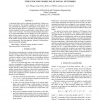Free Online Productivity Tools
i2Speak
i2Symbol
i2OCR
iTex2Img
iWeb2Print
iWeb2Shot
i2Type
iPdf2Split
iPdf2Merge
i2Bopomofo
i2Arabic
i2Style
i2Image
i2PDF
iLatex2Rtf
Sci2ools
108
Voted
ICASSP
2011
IEEE
2011
IEEE
Time-evolving modeling of social networks
A statistical framework for modeling and prediction of binary matrices is presented. The method is applied to social network analysis, specifically the database of US Supreme Court rulings. It is shown that the ruling behavior of Supreme Court judges can be accurately modeled by using a small number of latent features whose values evolve with time. The learned model facilitates the discovery of inter–relationships between judges and of the gradual evolution of their stances over time. In addition, the analysis in this paper extends previous results by considering automatic estimation of the number of latent features and other model parameters, based on a nonparametric–Bayesian approach. Inference is efficiently performed using Gibbs sampling.
Related Content
| Added | 20 Aug 2011 |
| Updated | 20 Aug 2011 |
| Type | Journal |
| Year | 2011 |
| Where | ICASSP |
| Authors | Eric Wang, Jorge Silva, Rebecca Willett, Lawrence Carin |
Comments (0)

